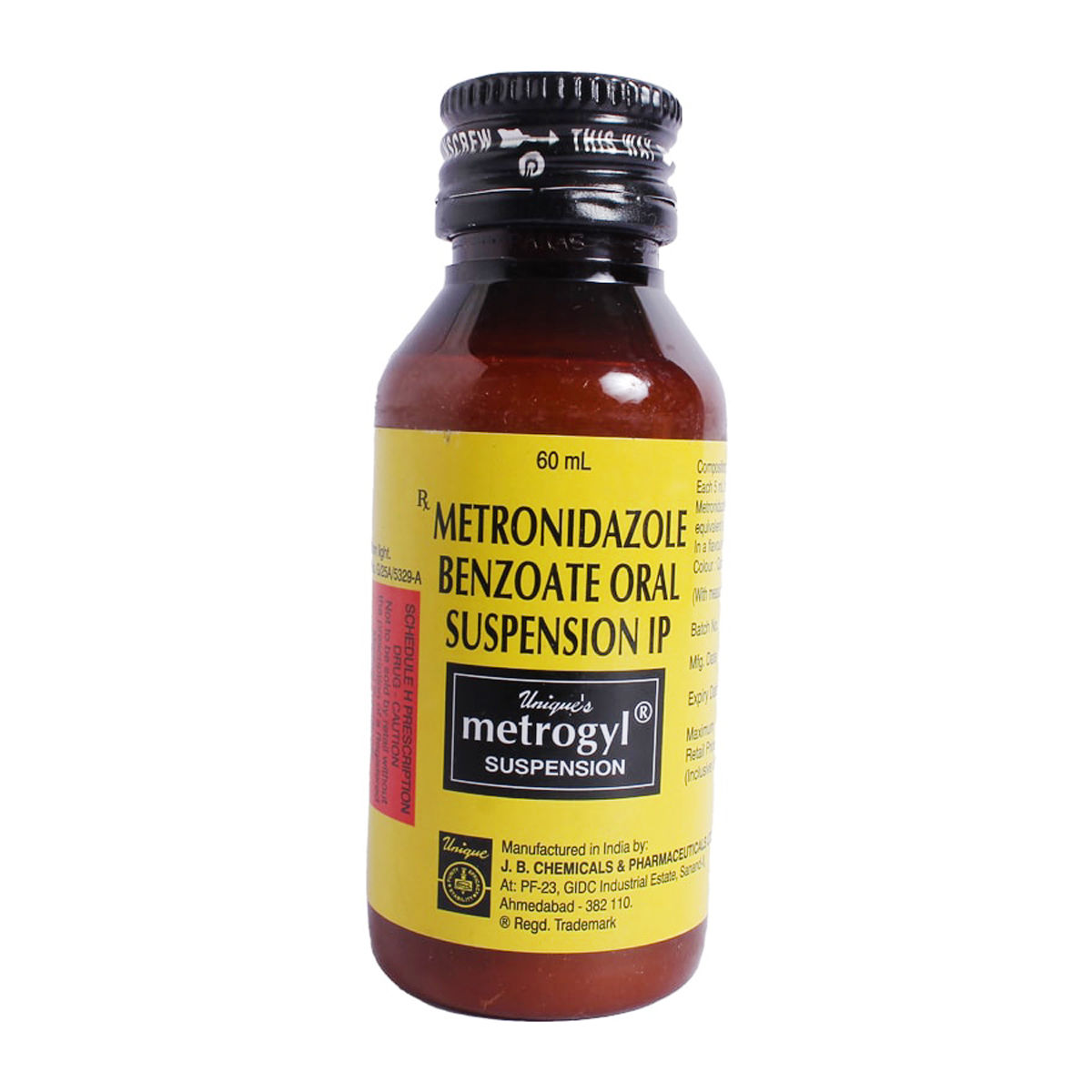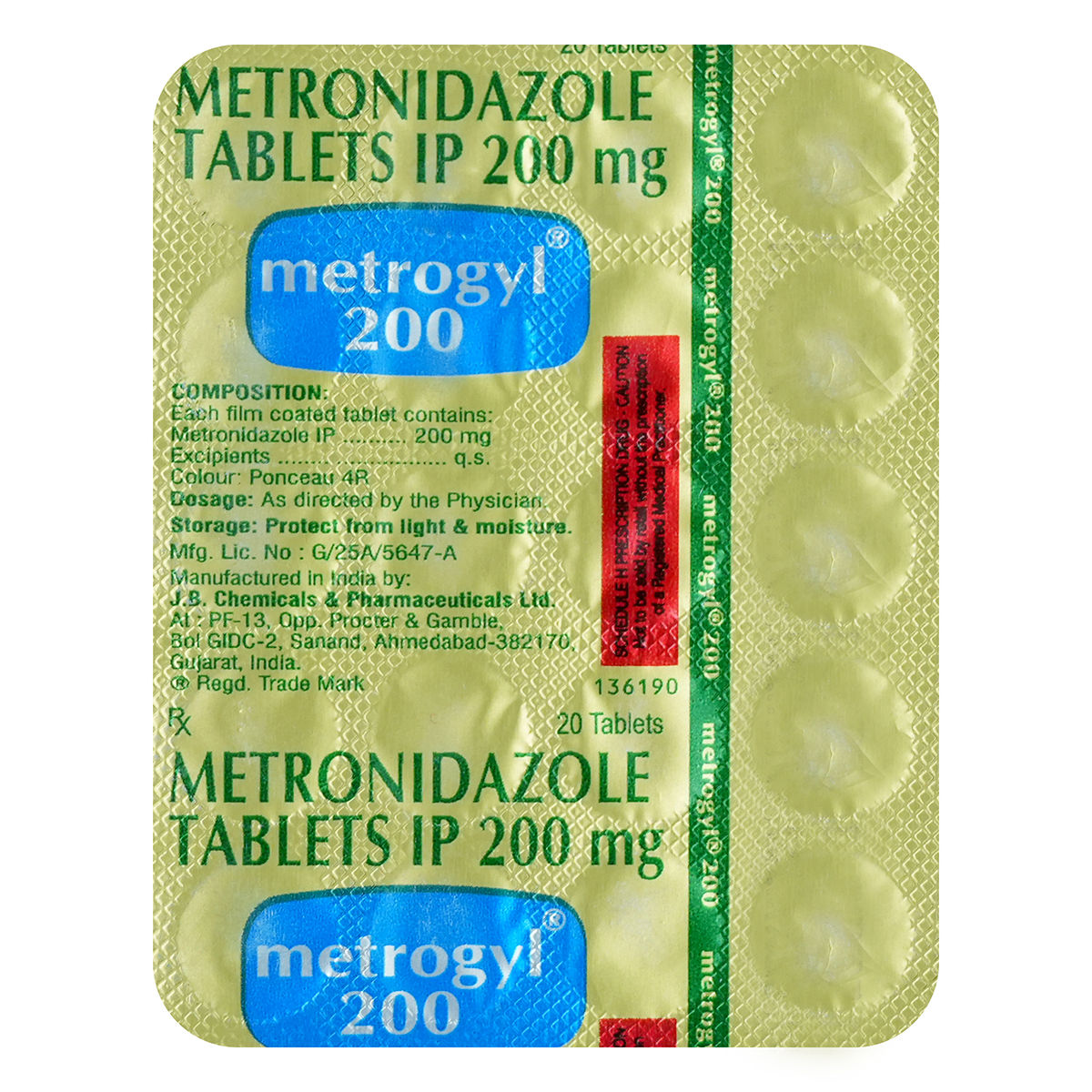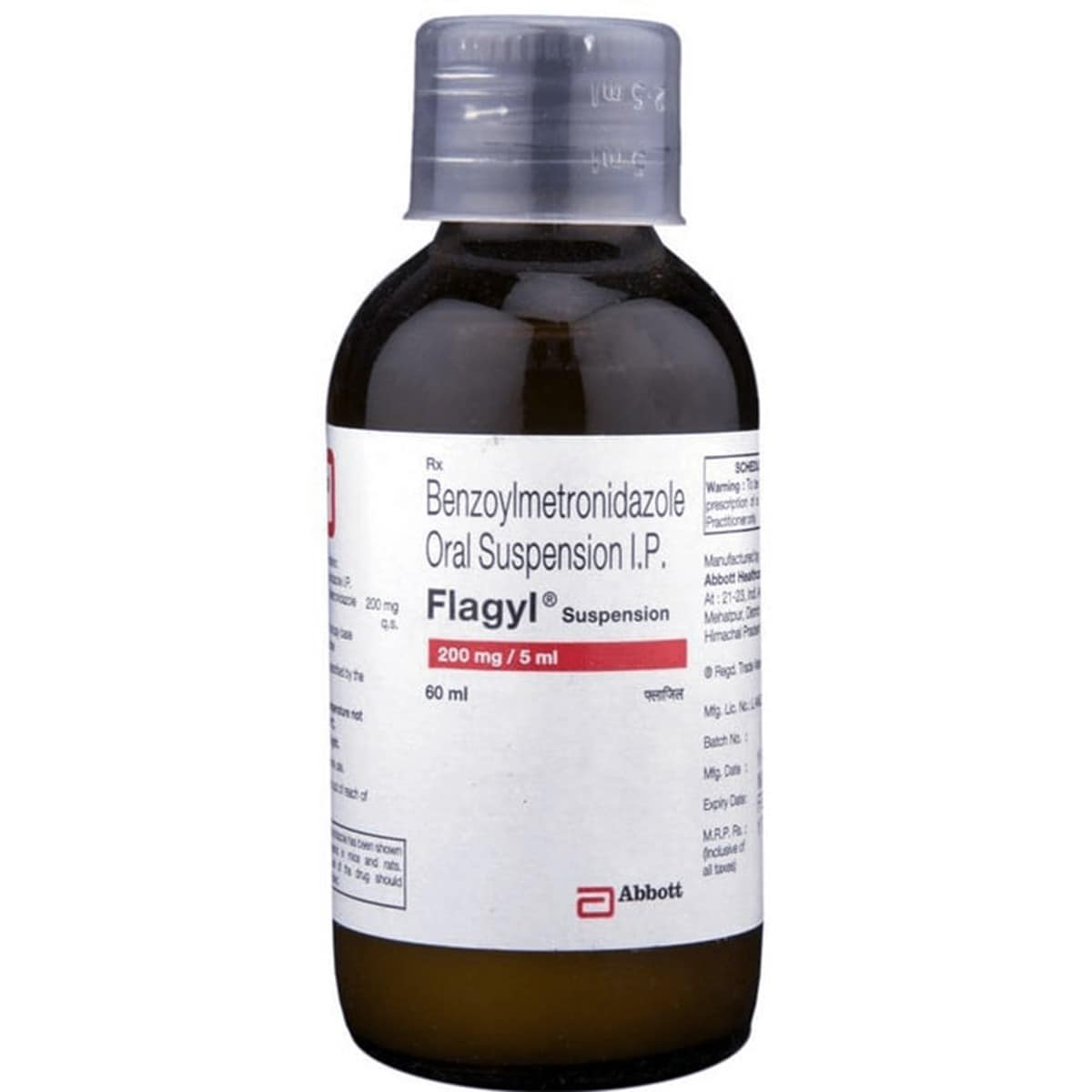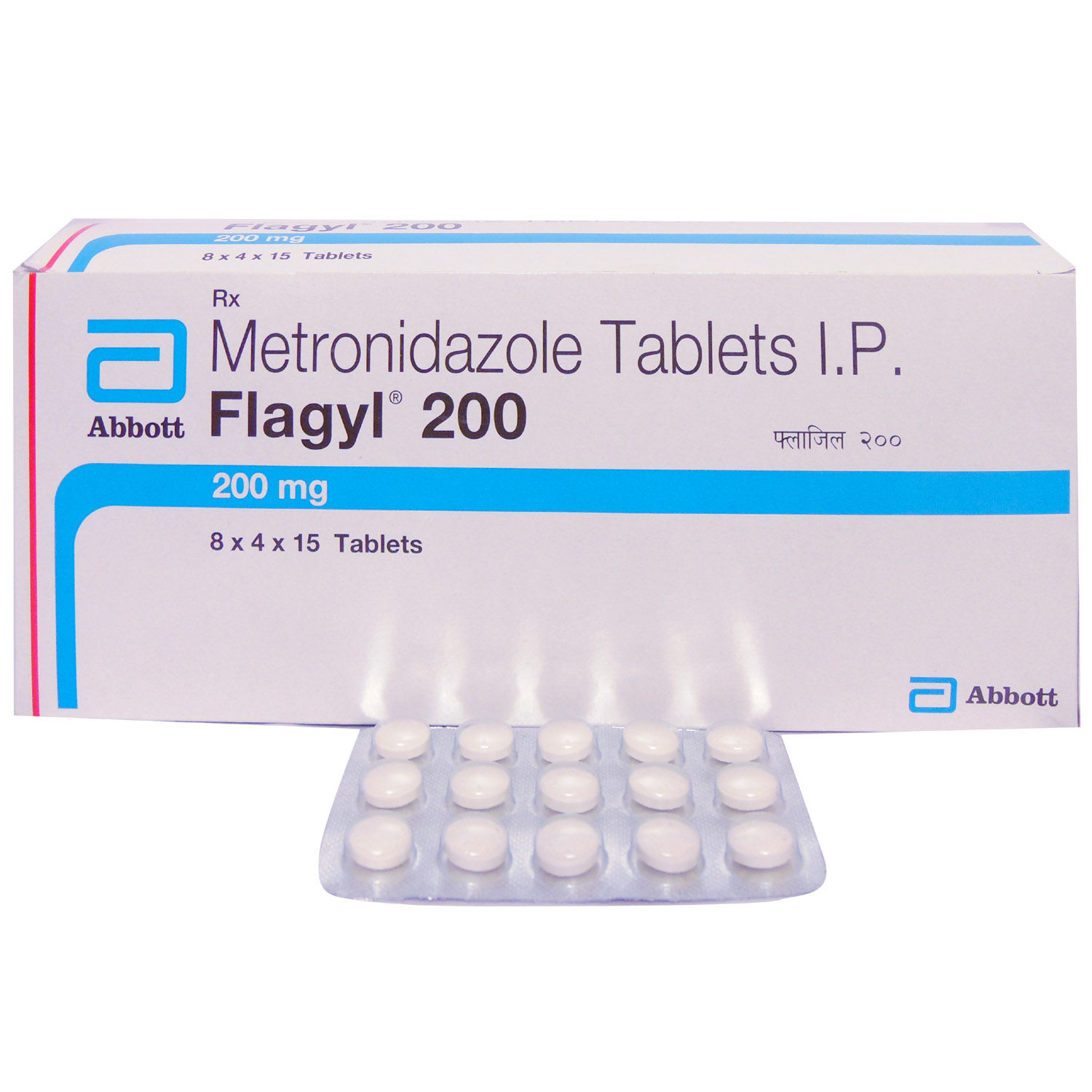Metrogyl Suspension 60 ml
₹30.4*
MRP ₹34.5
12% off
₹30.36*
MRP ₹34.5
12% CB
₹4.14 cashback(12%)
Free Delivery
With Circle membership
(Inclusive of all Taxes)
This offer price is valid on orders above ₹800. Apply coupon PHARMA10/PHARMA18 (excluding restricted items)
Know Your Delivery Time
Provide Delivery Location


Available Offers
Whats That

Secure Payment

India's Most Trusted Pharmacy

Genuine Products
Composition :
Manufacturer/Marketer :
Consume Type :
Return Policy :
Expires on or after :
About Metrogyl Suspension
Metrogyl Suspension belongs to a group of medicines known as anti-microbial agents used to treat bacterial infections of the blood, brain, lung, bone, pelvic area, stomach lining, intestines, gum, teeth, following childbirth or wound infection following an operation. It is also used to treat infected leg ulcers, pressure sores, stomach ulcers caused by Helicobacter pylori, urinary or genital infections caused by Trichomonas parasite, amoebiasis (parasitic infection of the colon), and to prevent infections after surgery.
Metrogyl Suspension contains metronidazole that works by preventing the production of proteins required by the harmful microorganisms for their survival. Thereby Metrogyl Suspension treats bacterial and parasitic infections.
Your doctor will decide the duration depending on the type of infection. Some common side effects of Metrogyl Suspension are nausea, vomiting, upset stomach, loss of appetite, dry mouth, and metallic taste. Most of these side effects do not require medical attention and resolve over time. However, if the side effects persist or worsen, consult a doctor.
Metrogyl Suspension should not be used during pregnancy, especially during the first trimester and while breastfeeding. Do not drive or operate heavy machinery after taking Metrogyl Suspension as it may cause dizziness and drowsiness. Avoid consumption of alcohol while on treatment with Metrogyl Suspension and for 48 hours after completing the course as it may cause unpleasant side effects. Keep your doctor informed about your health condition and medications to rule out any side effects.
Uses of Metrogyl Suspension
Directions for Use
Medicinal Benefits
Metrogyl Suspension contains metronidazole used to treat and prevent bacterial and parasitic infections including blood, brain, bone, lung, stomach lining, pelvic area and genital infections, amoebiasis, gum and teeth infections, infected leg ulcers or pressure sores, stomach ulcers caused by Helicobacter pylori, urinary or genital infections caused by Trichomonas parasite. Furthermore, it can also be used to treat infections following childbirth or in a wound following an operation. It works by preventing the infection-causing bacteria or parasites from growing.
How Metrogyl Suspension Works
Storage
Side Effects of Metrogyl Suspension
- Nausea
- Vomiting
- Diarrhoea
- Metallic taste
What if I have taken an overdose of Metrogyl Suspension
Drug Warnings
Do not take Metrogyl Suspension if you are allergic to any of its components. Metrogyl Suspension should not be used during pregnancy, especially during the first trimester. So, let your doctor know if you are pregnant or planning to get pregnant. Avoid breastfeeding while taking Metrogyl Suspension and for 12-24 hours after completing the course. Do not drive or operate heavy machinery after taking Metrogyl Suspension as it may cause dizziness and drowsiness. Inform your doctor if you have Clostridium difficile-associated diarrhoea, bone marrow depression/low blood count, CNS disorder, epilepsy, porphyria (blood disorder), peripheral neuropathy, heart, kidney or liver problems.
Drug-Drug Interactions
Drug-Drug Interactions
Login/Sign Up
Drinking alcohol while taking Metrogyl Suspension 60 ml can increase the risk or severity of side effects.
How to manage the interaction:
Taking Metrogyl Suspension 60 ml with Ethanol is avoided as it can result in an interaction, it can be taken if your doctor has advised it. However, if you experience flushing, throbbing in head and neck, throbbing headache, difficulty breathing, nausea, vomiting, sweating, thirst, chest pain, rapid heartbeat, palpitation, low blood pressure, dizziness, lightheadedness, blurred vision, and confusion, contact a doctor immediately. Do not discontinue any medications without consulting a doctor.
Coadministration of Disulfiram with Metrogyl Suspension 60 ml can increase the risk of side effects.
How to manage the interaction:
Taking Metrogyl Suspension 60 ml and Disulfiram together is generally avoided as it can lead to an interaction, it can be taken if advised by your doctor. However, if you experience sudden dizziness, confusion, weakness, shortness of breath, or palpitations, contact your doctor. Do not discontinue any medications without consulting a doctor.
Co-administration of Amprenavir with Metrogyl Suspension 60 ml can increase the risk or severity of side effects.
How to manage the interaction:
Taking Metrogyl Suspension 60 ml with Amprenavir is generally avoided as it can result in an interaction, it can be taken if your doctor has advised it. However, if you experience throbbing in the head and neck, throbbing headache, difficulty breathing, nausea, vomiting, sweating, thirst, chest pain, rapid heartbeat, palpitation, low blood pressure, dizziness, lightheadedness, blurred vision, and confusion, contact a doctor immediately. Do not discontinue any medications without consulting a doctor.
Coadministration of Busulfan and Metrogyl Suspension 60 ml may increase the risk of side effects.
How to manage the interaction:
Taking Metrogyl Suspension 60 ml and Busulfan together can result in an interaction, it can be taken if your doctor has advised it. However, if you experience unusual bruising or bleeding, fever, diarrhea, sore throat, muscle aches, shortness of breath, or burning during urination, contact a doctor immediately. Do not discontinue the medication without a doctor's advice.
Coadministration of Metrogyl Suspension 60 ml with warfarin can increase the risk of bleeding.
How to manage the interaction:
There is a possible interaction between Metrogyl Suspension 60 ml and warfarin, but they can be taken together if a doctor has prescribed them. Consult a doctor if experience unusual bleeding or bruising, vomiting, blood in your urine or stools, headache, dizziness, or weakness. Do not stop using any medications without talking to a doctor.
Coadministration of Metrogyl Suspension 60 ml with mebendazole may increase the risk or severity of side effects.
How to manage the interaction:
Although there is a possible interaction between Metrogyl Suspension 60 ml and mebendazole, they can be taken together if your doctor has prescribed them. However, if you experience any unusual symptoms like fever, body ache, painful red rash, cough, peeling of the skin, or Drooling, contact a doctor immediately. Do not stop using any medications without talking to a doctor.
Co-administration of Fluconazole together with Metrogyl Suspension 60 ml can increase the risk of an irregular heart rhythm.
How to manage the interaction:
-Taking Metrogyl Suspension 60 ml with Fluconazole together can possibly result in an interaction, but it can be taken if a doctor has advised it. However, consult a doctor immediately if you experience any symptoms such as dizziness, lightheadedness, fainting, shortness of breath, or heart palpitations. Do not discontinue any medications without consulting a doctor.
Drug-Food Interactions
Drug-Food Interactions
Login/Sign Up
Diet & Lifestyle Advise
It would be best to take probiotics after taking the full course of Metrogyl Suspension to restore healthy bacteria in the intestine that may have been killed. Taking probiotics after antibiotic treatment can reduce the risk of antibiotic-associated diarrhoea. Certain fermented foods like yoghurt, cheese, sauerkraut and kimchi can help restore the intestine's good bacteria.
Include more fibre-enriched food in your diet, as it can be easily digested by gut bacteria which helps stimulate their growth. Whole grains like whole-grain bread, and brown rice, should be included in the diet.
Avoid intake of alcoholic beverages with Metrogyl Suspension as it can make you dehydrated and affect your sleep. This can make it harder for your body to aid Metrogyl Suspension in fighting off infections.
If you have diarrhoea, drink appropriate amounts of fluids to avoid dehydration.
Habit Forming
Therapeutic Class
Metrogyl Suspension Substitute

Metrogyl 200 Tablet 20's
₹0.90per tabletFlagyl Suspension 60 ml
₹0.52per tabletFlagyl 200 Tablet 15's
₹0.81per tabletMetrogyl 200 Tablet 15's
₹1.05per tabletMETRONIDAZOLE 200MG TABLET
₹0.72per tablet
Product Substitutes
Alcohol
Unsafe
You are recommended not to consume alcohol while on treatment with Metrogyl Suspension and for 48 hours after completing the course to avoid unpleasant side effects such as nausea, vomiting, stomach pain, palpitations, headache, and hot flushes.
Pregnancy
Unsafe
Metrogyl Suspension should not be used during pregnancy, especially during the first trimester. Inform your doctor if you are pregnant or planning for pregnancy.
Breast Feeding
Unsafe
Avoid breastfeeding while taking Metrogyl Suspension and for 12-24 hours after completing the course.
Driving
Caution
Metrogyl Suspension may cause dizziness and drowsiness; thus, avoid using machinery or driving unless you are alert.
Liver
Caution
Metrogyl Suspension to be taken with caution, especially if you have a history of liver diseases/conditions. Your doctor may adjust your dose depending upon your liver conditions.
Kidney
Caution
Metrogyl Suspension to be taken with caution, especially if you have a history of kidney diseases/conditions. Your doctor may adjust your dose depending upon your kidney conditions.
Children
Safe if prescribed
Metrogyl Suspension should be given to children only if prescribed by a doctor. Your doctor may adjust the dose as per the age.
FAQs
Country of origin
Manufacturer/Marketer address
Customers Also Bought
Disclaimer
Author Details
We provide you with authentic, trustworthy and relevant information



















